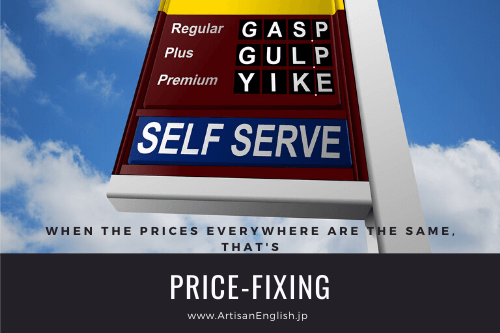
YouTube / iTunes / Spotify / Radio Public / Pocket Casts / Google Podcasts / Breaker / Overcast
Listen to ArtisanEnglish.jp posts & lesson intros here.
WotD: Price-fixing
Competition is the bedrock of a free market and is good for the customer.
It allows consumers to find the best price.
Price-fixing, on the other hand, is the enemy of the free market because it eliminates competition and deprives the consumer of choice.
Unfortunately, price-fixing has always existed.
Price-fixing occurs when sellers form a cartel and agree not to sell a product or service below a specific price.
This way, they eliminate price competition and force consumers to pay a higher-than-normal rate.
Way back in February 1974, 12 Japanese refineries were indicted for price-fixing gasoline prices, which resulted in a 100% increase in the price.
100%, can you believe that?
Much more recently, in 2018, there was ‘The great Canadian bread price-fixing scandal.‘
What happened, in this case, was the primary bread manufacturers agreed to increase bread prices and then met with the large supermarket chains to convince them to agree.
The agreement was finally discovered after 14 years.
It’s estimated that this price-fixing scandal cost the average Canadian bread consumer around $400 over 14 years.
Back in Japan again, just last year in 2019, eight major road construction companies were charged with arranging to form a cartel and then raise the price of asphalt.
It’s dirty, mean and untruthful, but price-fixing is everywhere.
It’s in every industry, from gasoline to bread.
The low (wo)man on the totem pole is always the one who gets hurt, and it’s not fair.
Flesch-Kincaid Readability Test
This post is understandable by someone with at least a 9th-grade education (age 15).
On the Flesch-Kincaid reading-ease test, this post scores 54.
The higher the score on a scale of 0 – 100, the easier the passage is to read.

